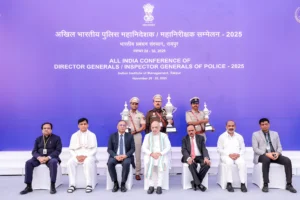
File Photo
Delhi Chief Minister Arvind Kejriwal, currently in judicial custody related to the alleged liquor policy scam, is to appear before the Rouse Avenue Court on Wednesday.
This follows the issuance of a production warrant by Special Judge Kaveri Baweja, who also extended Kejriwal’s judicial custody through 11 September.
The Central Bureau of Investigation (CBI) recently filed a supplementary charge sheet against Kejriwal and other individuals implicated in the excise policy case.
The Supreme Court is yet to deliver its verdict on Kejriwal’s appeal challenging his arrest and seeking bail.
On 5 September, the bench of Justices Surya Kant and Ujjal Bhuyan reserved its judgment after hearing arguments from both sides.
Singhvi: CBI’s Arrest Of Kejriwal Was Hasty; Bail Criteria Met
Senior advocate Abhishek Manu Singhvi, representing the Aam Aadmi Party (AAP) leader, argued that the CBI’s arrest of Kejriwal appeared to be a hasty measure to prevent his release in a related money laundering case.
Singhvi asserted that Kejriwal, as a high-ranking constitutional officer, met all criteria for bail; he is neither a flight risk nor a threat to tamper with evidence.
SV Raju: Kejriwal’s Release Could Compromise Witnesses; Trial Court Should Have Handled Bail
Conversely, Additional Solicitor General (ASG) SV Raju opposed the bail, expressing concerns that Kejriwal’s release could lead to witnesses becoming hostile.
Raju emphasized that AAP candidates’ statements in the Goa Assembly election emerged only after Kejriwal’s arrest, suggesting that their testimonies might become compromised if he received bail.
Raju also contended that the trial court should have addressed Kejriwal’s bail plea initially, rather than the Delhi High Court.
He argued that the court ordered the arrest and dismissed any claims of fundamental rights violations as unfounded.
Kejriwal’s special leave petition to the Supreme Court challenges both his arrest and remand orders, seeking bail in the corruption case.
The CBI has accused Kejriwal of attempting to politicize the issue, despite multiple court orders suggesting substantial evidence against him.
On 12 July, the Supreme Court had granted Kejriwal interim bail in connection with a separate money laundering case filed by the Enforcement Directorate (ED).
However, the CBI’s ongoing investigation obstructed his release.
Also Read: CBI Flags Key Discrepancies In RG Kar Medical College Doctor’s Murder Investigation
To read more such news, download Bharat Express news apps


















